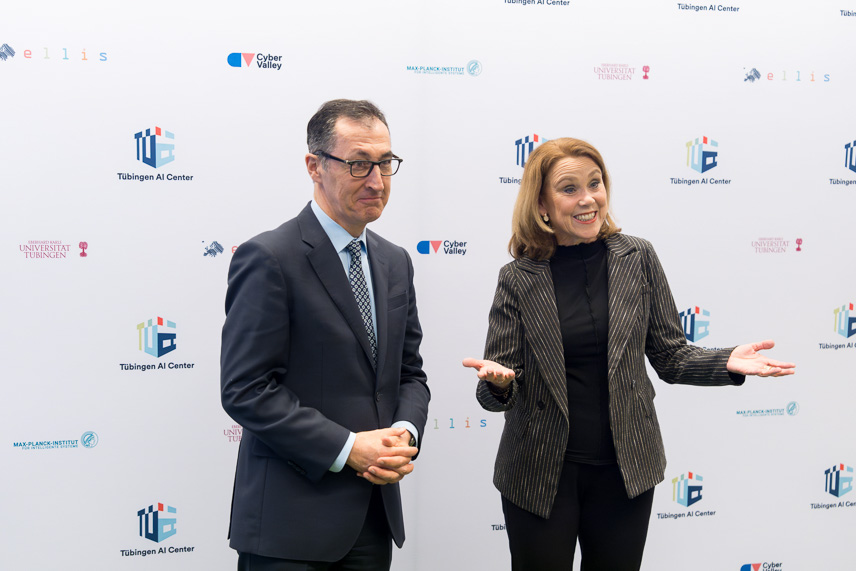
Federal Research Minister Cem Özdemir today visited the AI Center in Tübingen. There, he learned about current developments and challenges in artificial intelligence (AI) research and its use in society. He was accompanied by Baden-Württemberg's Minister of Science, Petra Ol-schowski. The Tübingen AI Center is a joint research facility of the University of Tübingen and the Max Planck Institute for Intelligent Systems, which is permanently funded by the federal and state governments.
"At a time when long-standing partnerships are faltering, technological sovereignty is becoming increasingly important, especially when it comes to a key technology like AI. That's why we need AI 'Made in Europe'. The AI competence centers funded by the federal and state governments play an important role in this. After all, the development of AI will continue to be largely driven by research," said Özdemir. "The Tübingen AI Center is an impressive example of how cutting-edge research and innovation can be advanced under one roof. Together with the partners in Cyber Valley, an outstanding AI ecosystem has been developed here. We must continue to invest in such regional ecosystems for key technologies.
Science Minister Petra Olschowski added: "The long-term funding of the Tübingen AI Center by the federal and state governments enables us to pursue a long-term research strategy, to train excellent AI scientists and thus to make successful AI technologies 'made in Germany' available to companies and society.
Public research and private digital economy can jointly develop innovative solutions
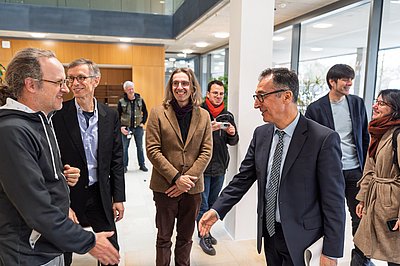
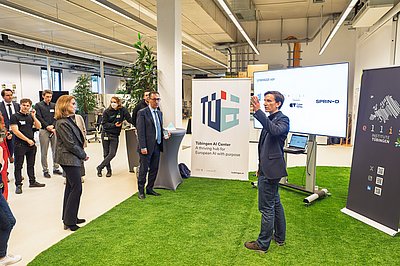
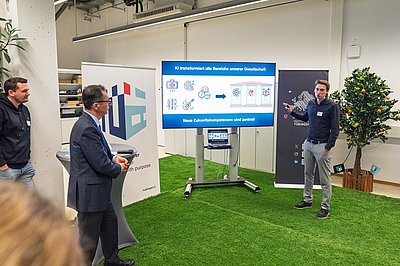
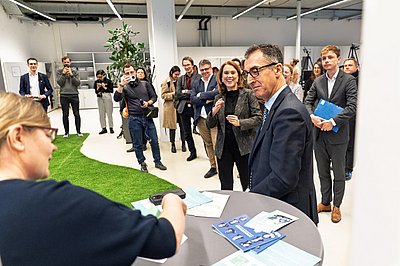
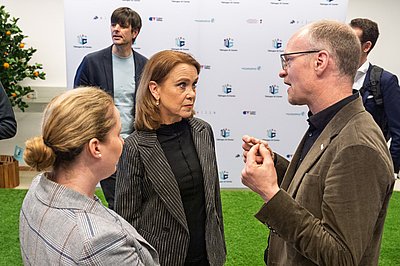

During their visit, the federal and state representatives gained insight into the work of the Tübingen AI Center. Using the example of an AI solution for personalized education, the researchers demonstrated how public research and the private digital economy can jointly develop innovative open source solutions for the benefit of society. The example shows how the combination of research, product development expertise and open source can make future innovations in public infrastructure cost-effective, accessible and effective. The Tübingen AI Center is also part of the OpenEuroLLM consortium, which has just started to develop an open source language model that is at least comparable to Deepseek and can handle all European languages. The research center is also proving to be an innovation accelerator in the start-up sector. Since February, the Polybot harvesting robot project has been supported by SPRIND, the Federal Agency for Leap Innovations.
Following the recent AI Action Summit in Paris, the researchers' main concern was to discuss the key points of a national AI strategy, which is urgently needed to secure Europe's sovereignty and competitiveness. There was agreement on the common goal of advancing artificial intelligence applications in as many areas of life as possible for the benefit of society in Germany and Europe.
Professor Dr. Dr. h.c. (Dōshisha) Karla Pollmann, Rector of the University of Tübingen, was represented at the meeting by Vice Rector Professor Samuel Wagner. On the occasion of the high-ranking visit from Berlin and Stuttgart, she said: "The University of Tübingen, together with the Tübingen AI Center, the ELLIS Institute Tübingen, the Max Planck Institute for Intelligent Systems and other partners and donors, stands for cutting-edge research in the field of AI. This is made possible by the many top-class scientists here in Cyber Valley, who are working on interdisciplinary solutions to important problems thanks to funding from the federal and state governments. It is crucial that we work together with policymakers to identify effective measures to better address the challenges facing society.
Targeted Investments for International Competitiveness
In addition to the board of directors of the Tübingen AI Center, representatives of ELLIS, Cyber Valley and SPRIND, as well as founders and advisors of the AI start-ups Black Forest Labs, Maddox, Meshcapade, Polybot and Prior Labs and the educational initiatives "KI macht Schule", the German Federal AI Competition and the Hector Future Fund took part in the discussion on the key points of a national AI strategy.
The aim of the discussion was to determine which concrete measures are particularly important for Germany to keep up with the global competition for AI supremacy. "Three-digit billion investments like Stargate seem out of reach, but a billion euros per year could make a lot of things possible," said Matthias Bethge, director of the Tübingen AI Center. The researchers recommend, among other things, the agile funding of specially assembled top teams, for example with the help of SPRIND, in order to develop large AI models for public applications. In addition, computing capacities for AI should be made available in a flexible and centralized manner, both from high-performance data centers and from private providers. Bethge emphasized that it is not only the amount of financial support that matters, but also quick decisions, stating: "Germany is ten times too slow in the global AI competition." To remedy this, he hopes to see an agility blitz program to radically reduce bureaucracy.
Attracting the best minds to Europe
At the European level, it has been suggested that more ELLIS institutes be established in Europe, following the example of Tübingen and Finland. The scientific director of the ELLIS Institute in Tübingen, Bern-hard Schölkopf, explained: "We need at least ten to fifteen world-class AI research institutes across Europe, playing in the same scientific league as ETH and Max Planck, and at the same time supporting spin-offs." From the outset, the vision of ELLIS was to create a European research organization similar to CERN and the European Molecular Biology Laboratory (EMBL). The ELLIS PhD program, which with 380 ELLIS Fellows has more outstanding AI professors than Stanford University, University of California Berkeley and MIT combined, already attracts thousands of top students from more than a hundred nations worldwide. It could very quickly become the most attractive PhD program in the world if it were strengthened by a European AI research society. As a particularly simple and quick measure, the program should be strengthened by a "Distinguished PhD Scholarship" to attract the best PhD students from the world's leading universities.
Overall, the researchers emphasized how much the European ELLIS initiative has already achieved with very little funding and urged for an ambitious national AI strategy that focuses on excellence and attracts the brightest minds.